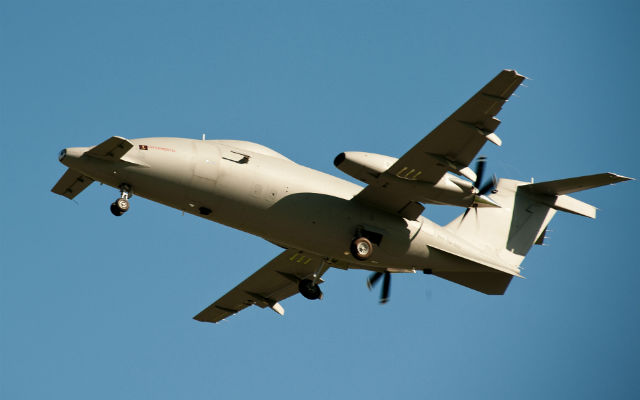Piaggio Aerospace is committed to securing a second European customer for its P.1HH HammerHead unmanned air vehicle by July’s Farnborough air show, following launch customer Italy’s commitment earlier this year to purchase six aircraft and three ground stations, for delivery in 2016.
“Our aim is to announce a second customer by then,” says chief executive Carlo Logli, who identifies Germany, Portugal, Spain and Sweden as being among “the few countries that still have to make a decision on a MALE [medium-altitude, long-endurance, UAV]”.
Piaggio had to wait 18 months for a first order after unveiling the HammerHead at the 2013 Paris air show. However, Logli is convinced that once the UAV goes into service with Italy early next year, it will persuade other potential customers to commit.
“What we are missing is delivery,” says Logli. “Until there is an aircraft flying, the market will be cautious. The UAV world is full of prototypes, but to take it to the next stage [certification and production] takes hundreds of millions of euros.”
He adds: “Italy is a small order but of extreme importance as it is such a prestigious customer. They didn’t buy it just because it was a national product. They believed in it from the beginning.”
The P.1HH, developed with Selex ES, is derived from the P180 Avanti business aircraft, which Piaggio has been producing since 1990. Sluggish sales of the eight-seat twin-pusher prompted the Genoa-based company, owned by Abu Dhabi investment fund Mubadala, to branch into the military and special missions market in recent years.
Logli maintains there are only two competitors to the HammerHead on the market: the General Atomics Aeronautical Systems MQ-9 Reaper and the Israel Aerospace Industries Heron. “This is a market that is exploding, but there is no one else serving it,” he says. “We have two engines, a higher ceiling and can fly in any conditions. This makes me optimistic.”
Piaggio is also completing the development of the Multirole Patrol Aircraft, a special missions variant of the P180, in partnership with Abu Dhabi Autonomous Systems Investments (ADASI). Piaggio is aiming to fly the aircraft by the end of the year, and deliver two examples to ADASI in 2016.
The MPA has two additional fuel tanks fitted in the rear of the cabin, as well as strengthened wings, canard and tail to double the aircraft’s endurance to 8h compared with a standard P180. Programme participants include Saab, Telephonics and FLIR.
Piaggio intends to display a demonstrator version of the MPA at November’s Dubai air show.
Source: Flightglobal

